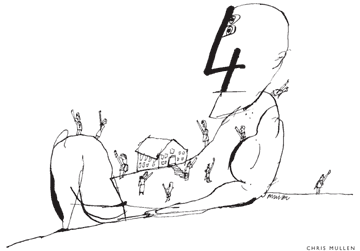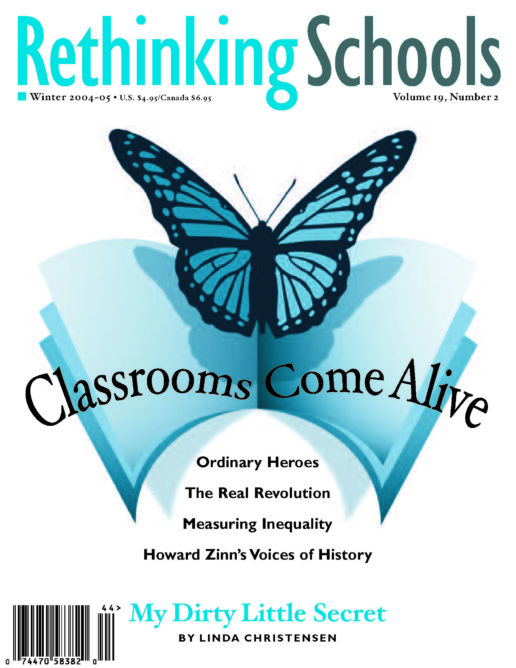Four More Years-of Resistance
Illustrator: Chris Mullen

Like so many others, Rethinking Schools editors awoke Wednesday morning, November 3, to the discouraging prospect of four more years. Four more years of war. Four more years of hostility to public schools. Four more years of attacks on civil rights, women’s rights, workers’ rights, the environment, and social programs of all kinds. Four more years of homophobia, fear-mongering, and proselytizing.
The danger is that in the face of such enormous power wielded by the president of the United States, we may forget the enormous power that we also wield. Yes, George W. Bush has been elected president for another four years, but his power is not absolute, and especially in the arena of education we have tremendous opportunities to effect change.
Educators often draw a distinction between our classrooms and “real life.” But classrooms are real life. Students really learn in classrooms, they really grow, they really change. Given the enormity of injustice throughout the world, including injustice sponsored by the current administration, teachers need to find new ways to encourage student questioning. We can create communities of conscience and critique. The critical habits of mind that we nurture in our classrooms can stay with students long after they’ve left school. In fact, many Rethinking Schools editors began a lifelong commitment to social justice during similarly grim times: the Nixon administration’s war on Vietnam, Reagan’s proxy wars in Central America, and George H.W. Bush’s attacks on civil rights and worker rights at home. So long as injustice exists, so too the possibility to name it and work to change it exists.
That’s where teachers come in. Bush may be president of the United States of America, but he is not president of our curriculum.
It is more vital than ever that teacher education programs sharpen their vision of critical classroom life. In teacher ed programs, just as in many school districts, No Child Left Behind is suffocating promising pedagogical approaches with a blanket of fear and substituting test-prep for real teaching. Still, there is extraordinary work going on in teacher preparation around the country, and we need to promote, celebrate, and extend these efforts. Here, too, we need to fill up all the political space available, as the great Brazilian educator Paulo Freire urged.
The Bush regime is touting its narrow margin of victory as a “mandate” and has announced plans to aggressively push its agenda—an agenda where the “free market” is proposed as the solution to all social ills. His prescription especially threatens education. For all their inequality, public schools are still authentic expressions of democracy and of our connections with one another. They assert that education is a birthright, that all can learn. They promise that what we teach the next generation should be a matter of public, not private, deliberations. We need to continue to defend public schools and all public institutions—indeed, the very idea of public institutions—as we make them more responsive, more equal, more vital.
Toward this end, educators can play key roles beyond the classroom. We must continue to experiment with new ways to organize school life and make it more responsive to student, social, and ecological needs. We have to keep building alliances between parents and teachers for quality public education and to challenge the standardizers who would reduce schools to test-prep academies. And we need to demand equitable funding for public schools.
Outside the arena of education, we can join broader social movements for justice. Some of us are old enough to remember Richard Nixon’s crushing victory over peace candidate George McGovern in 1972. Nixon easily won a second term, but his “mandate” to pursue the war was trumped by a massive antiwar movement, including agitation within the U.S. military itself. Electoral victories don’t necessarily translate into policy victories.
Despite disappointing results at the polls, this November’s election triggered a tremendous grassroots mobilization. This unprecedented outpouring offers grounds for optimism about similar activism in the coming years. Now is not the time to succumb to cynicism. That’s self-defeating. Change can only come when we act on the assumption that change is possible. Bush is president of the United States, but he is not president of our sense of possibility, our sense of hope.

